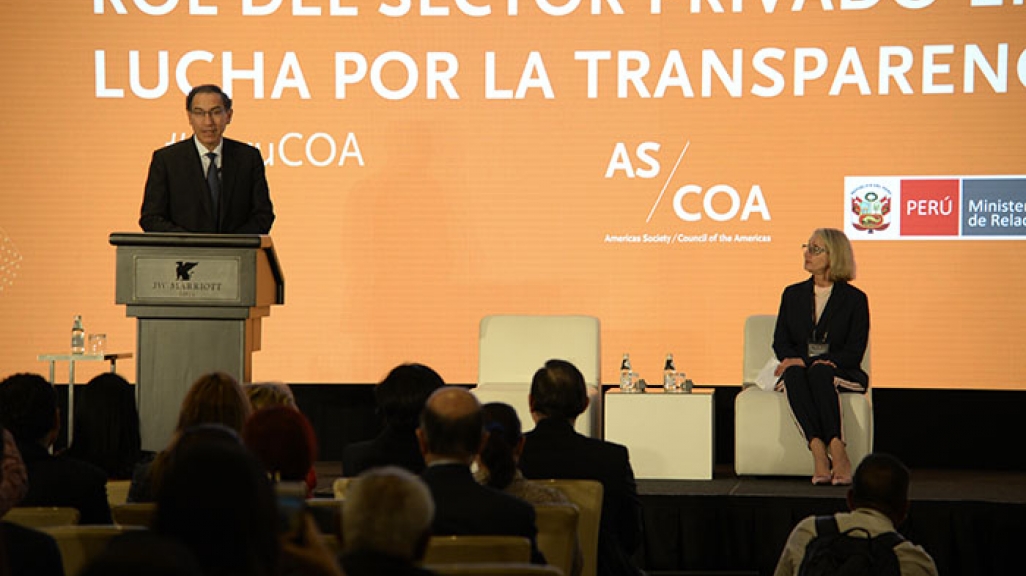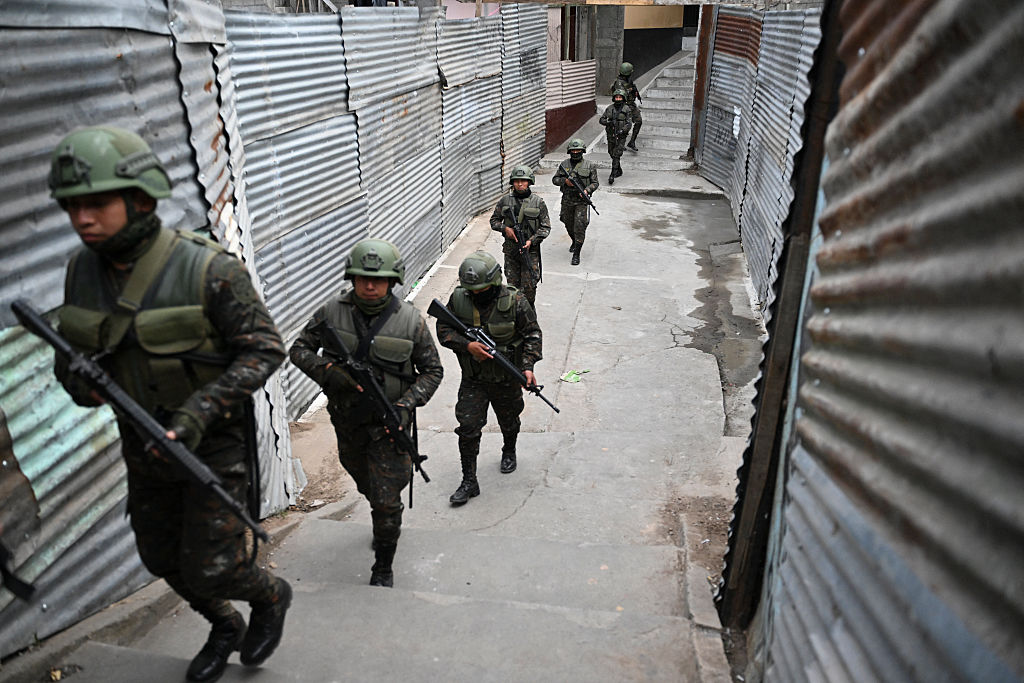#PeruCOA Recap: The Role of the Private Sector in the Quest for Transparency
#PeruCOA Recap: The Role of the Private Sector in the Quest for Transparency
Peru’s president joined public- and private-sector leaders in this conference to discuss effective strategies for fighting corruption in the country and across the region.
Lea una versión del resumen en español.
Three days before Peru held an anti-corruption vote, Council of Americas convened government officials and business executives in Lima to discuss “The Role of the Private Sector in the Quest for Transparency.” AS/COA Vice President Ragnhild Melzi opened the annual AS/COA conference by explaining how Peru can become model in the fight against corruption across Latin America. Melzi said the country, in addition to having presented sustainable economic growth in the last decade, also leads initiatives such as the Lima Group and the Pacific Alliance, as well as playing host to the 2018 Summit of the Americas. President Martín Vizcarra, Melzi said, was one of the few regional leaders to have made concrete steps towards accountability, and “today, we are here to understand and propose concrete solutions that can lead us to transparency and sustainable development in Peru and the region.”
“The fight for transparency is the antidote to the corruption epidemic,” said Peruvian Foreign Relations Minister Néstor Popolizio, who spoke next. “It’s the cornerstone to strengthening government institutions and the public’s trust.” But, he added, because so much crime is transnational, the fight against corruption must be a concerted, regional effort. He called the private sector a “strategic” and “fundamental ally” in those efforts.
#PeruCOA “La Transparencia disminuye la distancia entre la sociedad y el Estado que genera desconfianza, es el antídoto contra la corrupcion” Néstor Popolizio, Ministro de Relaciones Exteriores #PeruCOA pic.twitter.com/vULN4fc53X
— Bertha Luisa (@bvallejos) December 6, 2018
Julio Velarde, the president of Peru’s Central Bank, next gave an in-depth historical analysis of Peru’s standing vis-à-vis its neighbors and the world. Traditionally, Latin America has been a closed market system with the exception of Mexico, but that’s starting to open up more now, especially through blocs like the Pacific Alliance, he said. Through the years, Latin American countries have learned macroeconomic discipline. Inflation rates in this century, for example, are much better than they were in the 1980s and 1990s—even in Argentina, he added. Velarde highlighted how Peru’s public deficit is better than expected at the moment, though he wanted it to get below 2 percent. And, while he was content with Peru’s sovereign ratings at the moment, with time its ratings could improve depending on commodities, institutional stability, and a waning popularity of populism.
"De los 5 países que le hacen frontera a Perú, Brazil es al que menos le exportamos por lo cerrado que es. Esperemos que eso cambie ahora", dice Presidente del @bcrpoficial Julio Velarde.#PeruCOA pic.twitter.com/QukmzGdI3e
— Americas Society/Council of the Americas (@ASCOA) December 6, 2018
Roque Benavides, president of the National Confederation of Private Business Institutions, cited a statistic that 51 percent of Peruvians tolerate some level of corruption. “All of us need to start by issuing a mea culpa,” he said, encouraging people to denounce all types of bribes, big and small. He also outlined the steps the Anti-Corruption Private Sector Council is taking to address transparency from within their own ranks, including implementing and monitoring their own code of ethics.
“Tenemos que enfrentar la corrupción con seriedad y desde el sector privado lo combatimos con mucha convicción” @Roque_Benavides cc/ @ASCOA#PeruCOA pic.twitter.com/Hf9pzcUoPR
— CONFIEP (@CONFIEP) December 6, 2018
An ensuing panel shared strategies for increasing transparency in the public and private sector. Lima Stock Exchange’s Francis Stenning, who moderated the conversation, opened with comments on the country’s success thus far in maintaining a high, steady rate of investment throughout the years, but warned that corruption puts that investment at risk.
Building preventative measures that create certainty for investors and ensure the public’s trust is thus paramount, and Sunday’s referendum is an example of how the government is committed to honesty and integrity. “We can’t just prosecute corruption. We need to prevent it,” said Secretary of Public Integrity Susana Silva, “We need to strengthen institutions, and the project starts from the executive, to the judiciary, to the police.” Silva noted how, in most countries, the doors to corruption opens with the elections of public officials, and that’s why she is working to engage civil society along with the public and private sector.
While Lava Jato scandals have been the most consequential in Peru and Brazil, Americas Quarterly’s Brian Winter says that’s a positive sign of maturing democracies. “Brazil and Peru are the countries where the middle class in Latin America has grown the most, and they are also the countries that have seen the biggest corruption scandals,” he said. “I don’t think it’s a coincidence. It’s because values are changing, and the middle class is demanding more transparency as they pay more taxes.”
CAF’s Carlos Santiso noted that South America is the most difficult place in the world to pay taxes and that modernizing these systems digitally could facilitate the process. Plus, keeping an online record of public transactions is also a great way to combat corruption, he said, highlighting Mexico City’s progress in getting 100 percent of public contracts on the web.
Mejores métricas, promover integridad, digitalización, metas concretas y promover integración y mecanismos anticorrupción entre sector público y privado, algunas de las claves en la lucha por la transparencia. #PeruCOA pic.twitter.com/6hhZCtd3bU
— Ricardo Miranda de Sousa (@RicardoMdeSousa) December 6, 2018
With regards to the private sector, digitalization can offer immense prospects for improved transparency and efficiency for banks and the public at large. The increasing number of monetary transactions carried out online rather than in cash has numerous advantages, noted Scotiabank’s Miguel Ucceli. For one, it reduces banks’ margin of error, increasing liquidity, and thus reducing interest rates. But Ucceli warns that these changes in the private sector must be accompanied by public policy.
“At the end of the day, we want to make quality contributions to the public at large,” added ProInversión’s Alberto Ñecco. “And if we’re not transparent, we can’t accomplish viable social projects.” But this requires a clear set of rules and standards as well as training for both public officials and businesses, he said.
President of Peru Martín Vizcarra closed the day with reflections on the conference’s theme, observing that, when it comes to corruption, it’s more efficient and economical to prevent it than to have to punish it. He noted that there is much work to be done when it comes to transparency, pointing out that, per the 2017 Latinobarómetro poll, 75 percent of people in the region do not have faith in institutions. Looking ahead to the December 9 referendum, the president noted that the public consultation should be seen as a way for Peruvians to wager on a country that is integrated, transparent, and free of corruption.
El presidente @MartinVizcarraC clausuró la conferencia "Rol del sector privado en la lucha por la transparencia", evento organizado por @cancilleriaperu y @ascoa #PerúCOA pic.twitter.com/nxMT3P89Yd
— Presidencia Perú (@presidenciaperu) December 6, 2018








